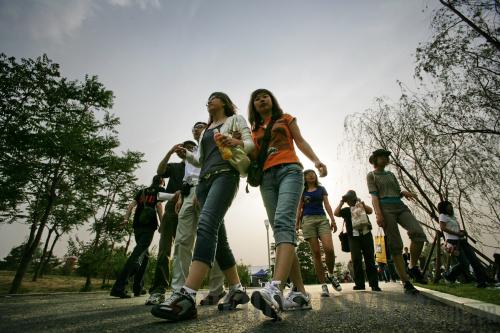|
 |
|
(WANG XIANG) |
Zhan is encouraged when he hears that applicants want to go to Africa or India. "I am happy because young people not only understand such overseas experiences can enrich their resumes, but [because] they are visiting places they've never been to," he says. "Through their actions, these young people have gained a deeper understanding of the world, and [can] discover true happiness."
But in China, only around 200 people have been sent to Africa by AIESEC since 2008 – a relatively small proportion of the organization's 3,000 overseas interns. Apart from late start dates compared with other overseas programs, the high cost of African programs blocks growth of internship numbers. Only free accommodation is provided for overseas internships. Interns must handle airfare costs and visa fees on their own. Additionally, while normally 25 interns are selected from every 100 candidates, sometimes, when it comes to African programs, the number is more like one out of 100. Standards for applicants' language skills and level of self-reliance are very high.
Zhan, who also belongs to the post-80s generation, wants to apply for AIESEC's African internship program after he completes his work at the organization. The idea came to him after he participated in an exchange visit with AIESEC's U.S. headquarters earlier this year. There he learned about the United Nations' Millennium Development Goal programs. Zhan is eager to join the UNICEF-run Africa program, and feels an African internship through AIESEC would definitely increase his understanding of the continent and help his application chances. "I have thought for a long time about going to Africa, but the time was not yet ripe. Now, I believe I am able to do what I really want to do there," he says.
Working in Africa can be an unforgettable experience. Liu Jing, a student at the Dongbei University of Finance and Economics, just completed her own internship this summer. Discussing her work experience in Togo, she says, "I remember the days of six colleagues from different countries squeezing into a taxi to go for talks [with clients] about a sponsorship deal. I also remember the passersby, the first [person] who greeted me by kissing my hand, and the poor kid infected with HIV who hugged me at an orphanage."
In her diary, Liu writes emotionally: "I do not know what I have [done] for this country, but I know that more than 300 girls can go back to school because of my and my colleagues' efforts this year, which could change their fates, their country, and even the world. With this in mind, [I believe] we [young generation] have the power: the power to change the world!"
|